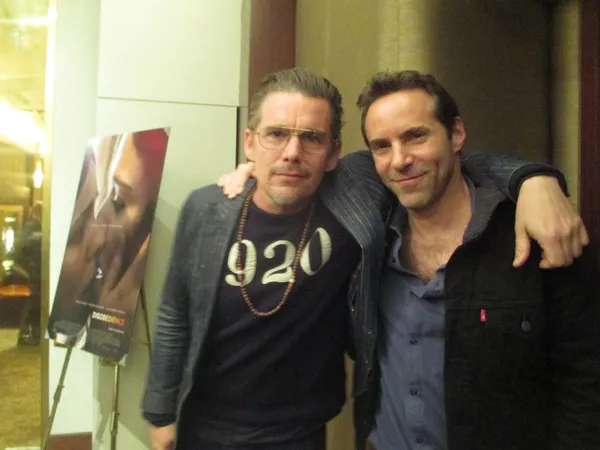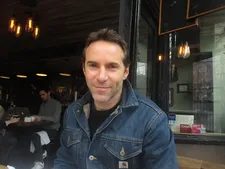Sebastián Lelio's Disobedience, co-written with Rebecca Lenkiewicz and based on the novel by Naomi Alderman, tackles the rules of tradition that come up against the physical quick violent pangs of rejection and lasting desire. Rachel Weisz (Ronit) and Rachel McAdams (Esti) let us read the nuances of their complicated feelings on their faces. The two women, whose past, present and future relationship the film centres on are emotional open books.
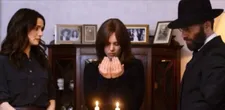 |
| Ronit (Rachel Weisz) with Esti (Rachel McAdams) and Dovid (Alessandro Nivola) in Disobedience |
Upon Ronit's arrival from the US back into the North London Orthodox Jewish community she had left so many years ago, she reunites with two old friends, Esti and Dovid (Alessandro Nivola), who was "like a son" to her father and replaced her in more than one way. It is Nivola's performance as the third party that is boldest in its opacity. From one second to the next, we do not know how Dovid, a rabbi, a man of faith, seemingly so set on his track, will react. Superbly suspended between menace and kindness, he remains the greatest mystery to us and to himself.
The week before the Obscured Pictures, Peggy Siegal invited screening of the Bleecker Street US distributed Disobedience in midtown Manhattan, Alessandro met with me for a breakfast conversation in Brooklyn on two films that will be shown at this year's Tribeca Film Festival. He is a co-producer along with Emily Mortimer, Ron Perlman, Josh Crook, and Scott Lochmus of Shawn Snyder's To Dust, starring Géza Röhrig and Matthew Broderick.
We start out with a discussion on how cynical the movie industry can be when attempting to emphasise the roles of women and move on to the timing of Disobedience, a Tribeca Film Festival highlight.
Anne-Katrin Titze: First of all, congratulations on having two films in Tribeca. The selection looks good this year, don't you think?
Alessandro Nivola: Seems that way. I've just had a cursory glance but it does look good. So little sold at Sundance so it seems there's more curiosity about these films because a lot of these distributors need to try to get some news.
AKT: I am curious about a lot of films this year.
AN: The festival has been growing in importance every year.
AKT: A lot more films made by women this year.
AN: That's happening all over the world. I keep getting sent scripts that were sent six months ago. The scripts I was sent six months ago, it was like - about a guy and his wife. I recently have been re-sent the same script. And it's now about a wife and her husband. And all they've done is swap the names around.
AKT: Really?
AN: That's how desperate people are to make movies about women.
AKT: That is very interesting.
 |
| Rachel McAdams as Esti with Rachel Weisz as Ronit: "In their teens, the two women had had a lesbian encounter." |
AN: I'm, not exaggerating. Not even any dialogue changed.
AKT: Let's begin with Disobedience.
AN: Disobedience happened after we had already been working on To Dust for two years trying to raise money, get it cast and get it off the ground. It was a total coincidence that this came along at that time. This movie's set in the North London Orthodox community. It's three friends who grew up together in an Orthodox community, two women and a man. In their teens, the two women had had a lesbian encounter.
Rachel Weisz's father was the community rabbi. He found out about it and sent her away to study in New York. She abandoned the Orthodox world all together and just kept living for the last 20 years as a modern woman in New York.
At the beginning of the movie the father [Rav Krushka played by Anton Lesser] dies. So she goes back to the community for the first time and discovers that her other two friends, the girl [Esti played by Rachel McAdams] and the guy have married each other.
AKT: You're the guy.
AN: Yes. He is being groomed, has been groomed, by her father to take over the community once he died. He was a sort of almost adopted son. He was the son that her father never had and he almost replaced her as his only child once she left.
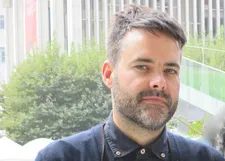 |
| Alessandro Nivola on Sebastián Lelio and Disobedience: "What he does so well in this movie is its incredibly balanced telling of the story." Photo: Anne-Katrin Titze |
So she comes back and moves into the house with the two of them in the two weeks leading up to the speech in the synagogue that I have to give to accept the leadership of the community. In that time their love affair sparks up again and my whole world gets thrown into chaos. It's a really great story.
AKT: It surely helps that Sebastián's A Fantastic Woman just won the Oscar.
AN: Deservedly! What he does so well in this movie is its incredibly balanced telling of the story. It doesn't create any villains. Religion isn't portrayed in a one-sided way. It's about three people in an impossible situation that is tearing all their three lives apart. They're all good people but forced to grapple with this problem.
I really did more research I think in preparation than I've ever done.
AKT: Was there anything during your research that doesn't show up in either of the films but that fascinated you? The Orthodox world is something of which we outsiders have very spotty knowledge, even here in New York.
AN: Yeah, because it's such a closed society. I had the good fortune of meeting the mother of one of my son's school friends, who happened to be the daughter of a Hasidic rabbi. She had grown up Hasidic and in her late teens had herself run away. She married an Asian guy and gave up the Orthodoxy. She still has all those siblings and she introduced me to them all. And I became really close with some of them and started spending a lot of time over there.
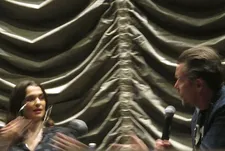 |
| Rachel Weisz talks Disobedience with Ethan Hawke in midtown Manhattan Photo: Anne-Katrin Titze |
They really invited me in to their houses and to their Shabbat dinners. I had I think as close an encounter as you possibly could not being Jewish. It wasn't what I expected at all. I had the impression that it was going to be so rigid and stern and frightening. And it was really sort of relaxed, joyful and sometimes drunken.
Once I was accepted in and there wasn't suspicion about me, It didn't have any kind of forbidden feeling. It felt very animated and alive. The community was incredibly tight-knit.
AKT: Something that is missing in many other places. Sense of community?
AN: Exactly. And that's what people who feel that other parts of the lifestyle are too difficult for them to continue to live with. When they're deciding to leave they're also leaving that kind of support. That's really the central dilemma of Disobedience.
One of the families that I ended up spending a lot of time with became the Hasidic advisor on To Dust. And then his son is in To Dust playing a character and he is in it as well. We filmed that after Disobedience. I've been preparing to film it before Disobedience.
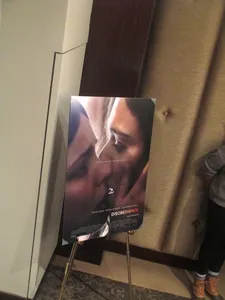 |
| Bleecker Street Disobedience poster at invited screening with Alessandro Nivola and Rachel Weisz Photo: Anne-Katrin Titze |
AKT: That's a nice circular movement.
AN: So all the people I met became invaluable to the To Dust process.
AKT: And now both will be shown in the same festival.
AN: My father died last year, right after I filmed Disobedience and I was away while I was shooting it and I just didn't want to waste any time. I had a very intense work ethic throughout the shooting of it. So that I felt like I wasn't mocking the time I was taking to indulge myself and doing this thing while he was in his final months. Even though he had begged me to do the job. I felt like I couldn't waste any time.
Spotlight Narrative Tribeca Disobedience premiere - Tuesday, April 24, 8:00pm - BMCC Tribeca PAC - Expected to attend: Sebastián Lelio, Alessandro Nivola, producer and star Rachel Weisz, composer Matthew Herbert, producer Frida Torresblanco, To Dust producer Emily Mortimer.
The 17th edition of the Tribeca Film Festival presented by AT&T runs from April 18 through April 29.








